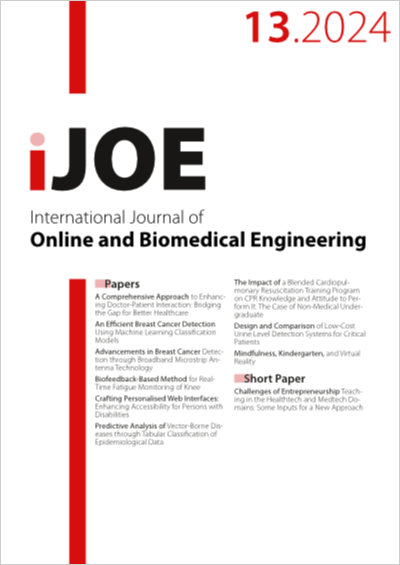Biofeedback-Based Method for Real-Time Fatigue Monitoring of Knee
DOI:
https://doi.org/10.3991/ijoe.v20i13.50101Keywords:
Muscle Fatigue, Biofeedback, Remote Rehabilitation, Real-time MonitoringAbstract
This paper introduces and implements a method to monitor muscle fatigue in real-time using a wearable biofeedback system to improve muscle rehabilitation treatments. The biofeedback system consists of an electromyography (EMG) sensor to capture muscle activity and two motion sensors to track knee angles. The proposed method for monitoring muscle fatigue involves three steps: (1) recognition of the movement phases during the knee extension exercise; (2) clipping of the EMG signal and calculation of fatigue-related metrics; and (3) normalization of metrics through a calibration process. An experimental session was performed with 10 healthy subjects performing 50 repetitions of the knee extension exercise. Processed data revealed changes in fatigue-related metrics, which align with existing literature. A comparison was also made between real-time and computer processing using raw data. While minor differences were noted between the two processing methods, the mobile app closely mirrored the trajectory of processed data in the cloud, ensuring reliability and consistency. This study advances remote muscle rehabilitation by quantifying muscle fatigue during treatment sessions. Thus, health professionals can tailor treatment plans based on individual patient characteristics, optimizing treatment duration, and reducing injury risk.
Downloads
Published
How to Cite
Issue
Section
License
Copyright (c) 2024 Tiago Franco, Pedro Rangel Henriques, Paulo Alves, Maria João Varanda Pereira, Paulo Leitão, Nelson Azevedo

This work is licensed under a Creative Commons Attribution 4.0 International License.



